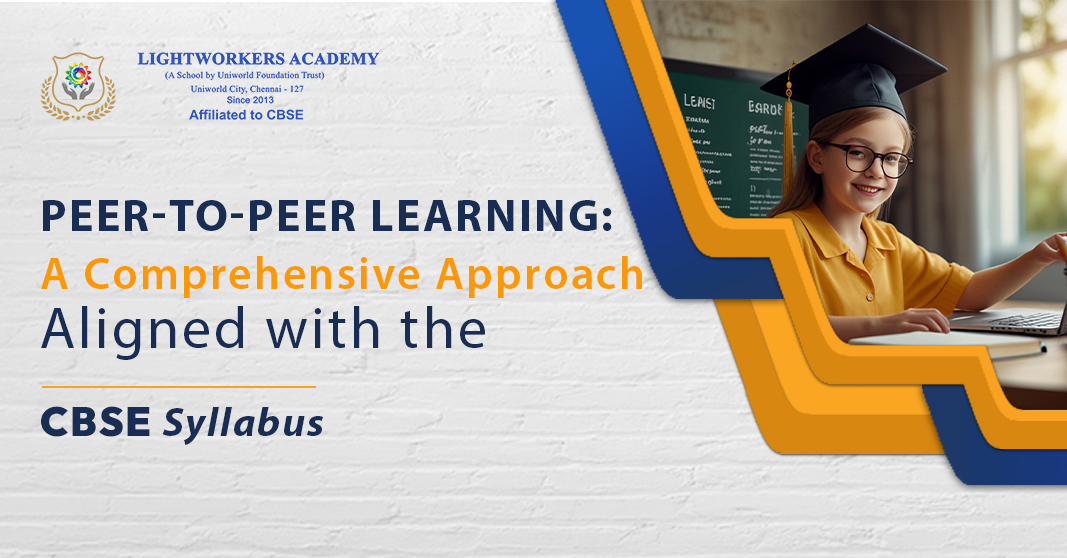At Lightworkers Academy, we are dedicated to offering a dynamic and effective learning environment, and one of our key strategies is peer-to-peer learning. This innovative approach is intricately aligned with the CBSE syllabus, ensuring that our students benefit from a comprehensive educational experience. As one of the best CBSE schools in Chennai, we are committed to incorporating advanced educational techniques that foster engagement and academic excellence.
Why Peer-to-Peer Learning Works
1. Enhanced Understanding
Peer-to-peer learning facilitates a deeper grasp of academic material. When students explain concepts to each other, they reinforce their own understanding and fill gaps in their knowledge. This method helps clarify doubts and strengthens comprehension. By integrating peer-to-peer learning into our curriculum, we enable students to engage more deeply with complex topics, enhancing their overall academic experience.
2. Development of Critical Thinking Skills
The collaborative nature of peer-to-peer learning encourages students to engage in discussions, debates, and critical analysis. This process promotes higher-order thinking skills and encourages students to approach problems from multiple perspectives. It aligns with the CBSE syllabus by fostering an environment where students develop the ability to think critically and solve problems effectively.
3. Increased Engagement
Students who participate in collaborative learning are often more engaged in their studies. Peer-to-peer learning creates a more interactive and dynamic classroom environment. When students contribute to each other's learning, they become more invested in the material. At Lightworkers Academy, this approach leads to higher levels of student participation and motivation, resulting in a more vibrant and effective learning environment.
4. Improved Communication Skills
One of the key benefits of peer-to-peer learning is the enhancement of communication skills. Students learn how to articulate their ideas clearly and listen actively to their peers. This mutual exchange of information helps them develop strong interpersonal skills, which are crucial for both academic success and future career prospects. Our approach aligns with the educational goals of the best CBSE schools in Chennai, which emphasize the importance of effective communication.
5. Fostering a Supportive Community
Peer-to-peer learning helps build a collaborative and supportive community within the school. Students learn to work together, offer assistance, and celebrate each other's successes. This sense of community contributes to a positive and inclusive school culture, which is a hallmark of the best CBSE schools in Chennai. At Lightworkers Academy, we believe that a supportive learning environment enhances students' overall educational experience and personal development.
How Lightworkers Academy Implements Peer-to-Peer Learning
1. Collaborative Projects
We design group projects that encourage students to collaborate, share insights, and learn from each other. These projects are carefully crafted to align with the CBSE syllabus and address real-world issues. By working together on these projects, students gain practical experience and develop teamwork skills that are essential for their future careers.
2. Study Groups
At Lightworkers Academy, we organize study groups where students can discuss course material, prepare for exams, and support each other with challenging topics. These study groups are structured to complement the CBSE curriculum and provide students with additional resources and support. The collaborative nature of these groups enhances learning and helps students achieve academic success.
3. Peer Tutoring Programs
We offer peer tutoring programs where students who excel in certain subjects help their classmates. This initiative not only supports those who need extra help but also reinforces the knowledge and teaching skills of the tutors. This approach aligns with our commitment to peer-to-peer learning and complements the educational goals of the best CBSE schools in Chennai.
4. Interactive Classrooms
Our classrooms are designed to facilitate interaction and discussion among students. We use a variety of teaching aids and technologies to support peer-to-peer learning and ensure that the CBSE syllabus is delivered effectively. The interactive nature of our classrooms encourages students to engage actively with the material and with each other.
5. Feedback and Reflection
We encourage students to give and receive feedback during peer-to-peer learning activities. This practice helps students reflect on their learning experiences, identify areas for improvement, and appreciate the value of collaborative learning. By incorporating feedback and reflection into our approach, we support the continuous growth and development of our students.
Lightworkers Academy FAQ about the best CBSE schools in Chennai
1. How does peer-to-peer learning benefit students at Lightworkers Academy?
It enhances understanding, develops critical thinking, increases engagement, and improves communication skills.
2. What makes Lightworkers Academy one of the best CBSE schools in Chennai for implementing peer-to-peer learning?
We integrate this approach into collaborative projects, study groups, and peer tutoring, aligned with the CBSE syllabus.
3. How are peer-to-peer learning activities structured at Lightworkers Academy?
Activities include group projects, study groups, peer tutoring, and interactive classroom sessions designed to support the CBSE curriculum.
4. Can peer-to-peer learning improve communication skills?
Yes, it helps students articulate their thoughts clearly and listen actively, enhancing their overall communication abilities.
5. How does peer-to-peer learning align with the CBSE syllabus?
It supports the curriculum by fostering critical thinking, collaborative problem-solving, and engagement with course material.


